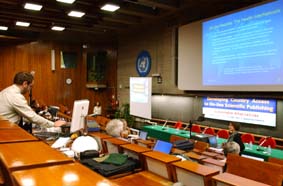Personal tools
News from ICTP 104 - What's New

Begun just 18 months ago, ICTP's eJournals Delivery Service has expanded to nearly 250 journal titles. Elsevier is the latest publisher to join the effort.
Ready Access
When the Abdus Salam International
Centre for Theoretical Physics / Third World Academy of Sciences
(ICTP/TWAS) Donation Programme launched the eJournals Delivery
Service (eJDS) in autumn 2001, ICTP staff scientist and Donation
Programme head, Hilda Cerdeira, hoped that the effort would help
overcome a chronic problem faced by scientists who live and work
in the developing world: limited access to the most current literature
in research fields where new discoveries are often made and announced
monthly, if not weekly (see "ICTP's
Journals Delivery Service," News from ICTP, Autumn
2001, pp. 2-3).
The deceptively simple solution masked the truly breakthrough
strategy that was involved. Instead of seeking information directly
on the web, eJDS subscribers, who often found themselves short
on bandwidth, money, or both, could quickly download files on
their email--a solution that was fast, cheap and instantaneous.
Some 18 months later, the project's success is revealed by its
numbers. More than 300 scientists from 62 countries now subscribe
to the service. As a result, a growing number of scientists from
the developing world's most impoverished countries now have the
ability to download the most up-to-date scientific literature
from a growing list of publishers that includes Academic Press,
American Physical Society, Optical Society of America, World Scientific
Publishing Co., and, most recently, Elsevier. All told, subscribers
can currently tap, via email, the contents of nearly 240 journals,
a list that likely includes the most prominent publications in
their fields.
Last autumn, e-Journals Delivery Service hosted a roundtable discussion
in Trieste to more fully examine the options that are available
to provide 'ready' information access to scientists working in
isolated areas of the developing world. The meeting, attended
by some 50 individuals--representatives of universities, research
centres, information providers and publishers--concluded with
a list of recommendations outlining the major issues that need
to be confronted if the promise of electronic communications is
to be realised by all scientists and not just those who are fortunate
enough to reside in countries that have the resources to fully
partake of these information technologies.

Round Table on Developing Country Access to On-Line Scientific Publishing: Sustainable Alternatives, 4-5 October 2002
Participants first and foremost concurred that efforts should
be made to broaden programmes like eJDS that provide web-to-email
access. Such efforts, it was agreed, offer the fastest and cheapest
solution to the developing world's information access problems.
Broadening such initiatives, however, will require encouraging
additional publishers to join the programme as well as forging
strategies for 'literally' spreading the word about the service
to scientific communities throughout the developing world, especially
scientists in the least developed countries (LDCs).
Participants also agreed that it would be necessary to provide
broadbased training to developing world scientists on issues related
to communications, networking, and web-enabling technologies.
Such training, they added, must take account of local needs and
skill levels.
Finally, participants agreed that it was essential to monitor
in real-time the rates of connectivity among those working in
research and educational institutions in developing countries.
Such baseline information is necessary for determining where the
bottlenecks exist and ultimately measuring the progress (or lack
of progress) that may take place in the future. Efforts to fulfil
this goal were put in place last November. To date, 20 developing
countries have been surveyed with the help of the PingER project
at Stanford Linear Accelerator Center (SLAC) in the United States.
New electronic information technologies hold the promise of creating
a level playing field for researchers from the North and South.
That promise, however, could well be overshadowed by a research
landscape marked by sharp peaks and valleys unless scientists
from the developing world are able to attain rapid and inexpensive
access to the most current literature in their fields.
The recent roundtable discussion in Trieste issued a challenge
to scientists and publishers alike not to allow this to happen.
The broad framework set out by the participants is designed to
ensure that information technologies fulfil their promise by providing
universal access to the most current scientific literature to
scientists in poor and rich countries alike. It is a challenge
that lies at the heart of ICTP itself.
For additional information about the ICTP/TWAS Donation
Programme's eJournals Delivery Service and the full text of the
Trieste Recommendations, see http://www.ejds.org
and http://www.ictp.it/ejournals/meeting2002/index.html,
or email ejds@ictp.trieste.it.